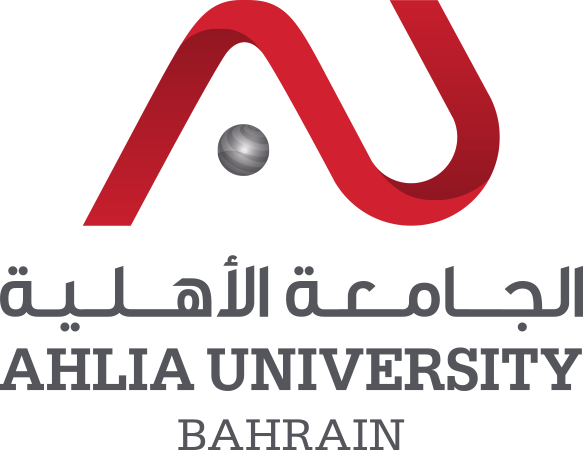
Goal 17 / 17.4 / 17.4.4
Sustainability Literacy
Sustainability Literacy at Ahlia University, Bahrain (2020–2025)
Ahlia University (AU) in Bahrain has adopted a comprehensive approach to sustainability literacy, embedding United Nations Sustainable Development Goals (SDGs) into its teaching, research, and community engagement since 2020. In line with Times Higher Education (THE) Impact Rankings criteria, AU demonstrates clear evidence of sustainability and SDG integration across curricula, student outcomes, faculty development, co-curricular programs, assessment initiatives, and institutional policies. The university’s efforts have been recognized globally – AU was ranked 14th (2021) and 23rd (2022) worldwide in THE Impact Rankings for Quality Education (SDG 4), and 1st in Bahrain ahlia.edu.bh. The following report details AU’s initiatives from 2020 onward, with official evidence, illustrating how sustainability literacy is fostered across the institution.
Integration of Sustainability and SDGs in Curricula
Curriculum Revision and SDG Alignment:
Ahlia University has systematically integrated sustainability and SDG-related topics throughout its undergraduate and graduate programs. In 2021, AU developed a new Sustainable Development Plan (2021–2025) prioritizing seven SDGs aligned with national strategies, with a special emphasis on Quality Education (SDG 4) ahlia.edu.bh ahlia.edu.bh. The academic programmes were comprehensively revised in structure and learning outcomes to align with SDG 4, ensuring that many courses and research projects explicitly address sustainable development challenges ahlia.edu.bh ahlia.edu.bh. AU reports that “academic programmes were revised with a consideration of Education for Sustainable Development (ESD) Framework by UNESCO”, aligning ESD competencies with the university’s graduate attributes ahlia.edu.bh. This alignment introduced new sustainability topics into specific course content across disciplines to “create a cultural mindset for the future generation”, embedding SDG concepts into the curriculum ahlia.edu.bh. Notably, AU’s integration of SDGs into coursework has spurred significant scholarly output – over 217 research studies (2020–2023) were published by faculty and students on sustainability-related topics, contributing recommendations to support society and policy-making ahlia.edu.bh.

Ahlia University was ranked (2021) 14th and (2022) 23rd worldwide by Times Higher Education Impact Ranking and 1st in Kingdom of Bahrain. The academic programs were revised in terms of Learning Outcomes and Structure to be aligned with UNSDG4 through number of courses and research topics. AU conducted international forums tackling quality of education and proposing measures for virtual learning.
AU attracted more than 28 national and international speakers from government ocials, academic experts and policy makers. The forums enable setting clear measures for UNSDGs specifically SDG4.
AU revised its graduate attributes and academic programmes to be aligned with UNSDGs by integrating new topics in specific courses contents to create a cultural mindset for the future generation. A new Teaching, Learning Excellence Policy was developed aligned with UNSDGs and focusing on life-long learning.
AU development in the area of SDG4 was selected to be presented as a case study in national and international debates and conferences. AU quality of education was measured during COVID-19 and learner satisfaction level was 81%. Conferences and Research Forums were conducted that focused on Education Quality and Management Practices that led to producing more than 3 Scopus indexed proceedings highlighting di‑erent best practices and recommendation for sustaining quality education.

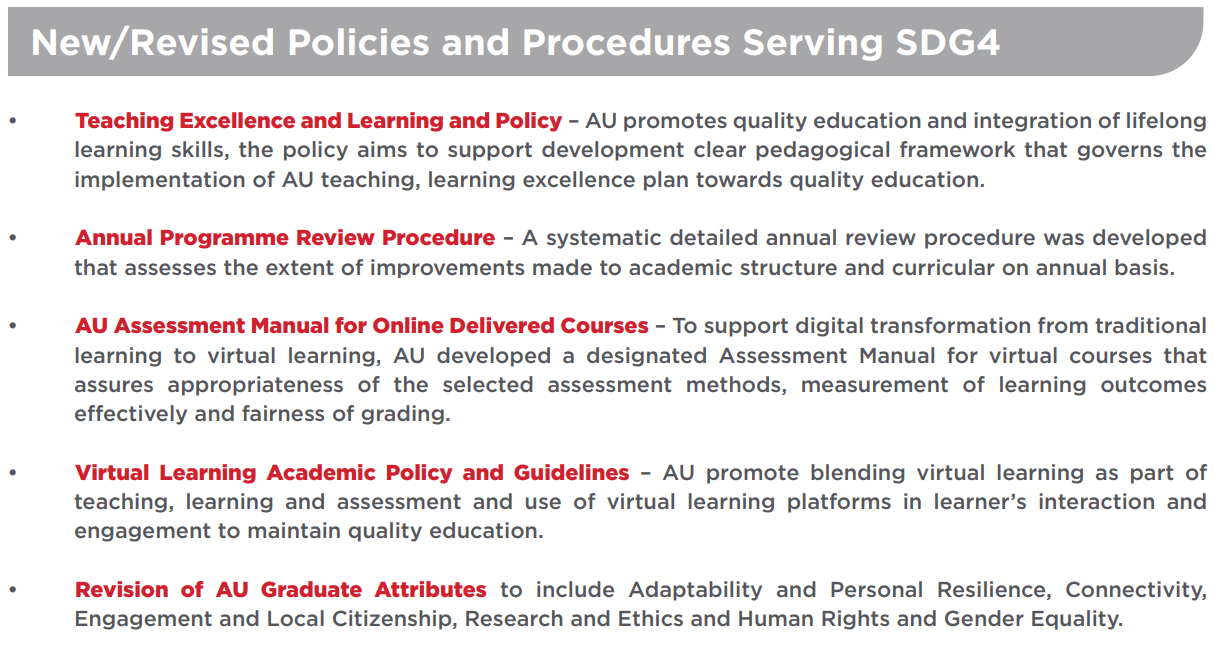
Sustainability-Focused Courses and Programs:
Across its colleges, AU offers numerous courses and even entire programs centered on sustainability. The Sustainable Research Centre at Ahlia (established to advance environmental sustainability research) has helped infuse topics like climate action, sustainable infrastructure, and resource management into the curriculum ahlia.edu.bh ahlia.edu.bh. Many degree programs incorporate sustainability modules; for example, business students study sustainable economics and ethics, while engineering and design students tackle sustainable technology and green design ahlia.edu.bh. AU has also launched specialized graduate degrees such as the M.Sc. in Sustainable Management and M.Sc. in Sustainable Interior Design, extending sustainability education into advanced studies in business and design fields ahlia.edu.bh. Overall, by 2023 the university affirmed that it “offers many sustainability-related courses across various fields, providing an active, student-centered learning environment that actively supports sustainability” ahlia.edu.bh. This breadth of curricular integration ensures that sustainability literacy is not confined to one program, but is diffused throughout all disciplines at AU.
Research Center
Ahlia University in Bahrain has established a dedicated Sustainable Research Centre that focuses on environmental sustainability and aligns with the United Nations Sustainable Development Goals (UNSDGs). This center is integral to the university’s commitment to embedding sustainability across its core functions, including teaching, research, and community engagement.
Sustainable Research Centre: Focus and Initiatives
The Sustainable Research Centre at Ahlia University promotes interdisciplinary research in various areas of sustainability, such as:
· Climate Action and Environmental Management: Developing strategies and policies to address climate change and promote environmental stewardship.
· Sustainable Infrastructure and Design: Exploring innovative building materials and sustainable interior design practices.
· Energy and Water Conservation: Investigating technologies and practices for efficient energy use and water management.
· Waste Reduction and Recycling: Implementing programs to minimize waste and promote recycling within the university and the broader community.
The center encourages faculty and students to engage in research projects that address these areas, fostering a culture of sustainability and innovation. Additionally, the university organizes seminars and workshops to disseminate research findings and promote knowledge exchange on sustainability topics.
Through these initiatives, Ahlia University demonstrates its dedication to advancing environmental sustainability and contributing to global efforts in creating a more sustainable future.
Research and Practical Training
The Sustainable Research Centre at Ahlia University promotes interdisciplinary research in areas like climate action, environmental management, and sustainable infrastructure. This center encourages faculty and students to engage in projects that address environmental challenges, fostering a culture of sustainability and innovation.
Furthermore, Ahlia University has participated in regional environmental competitions, such as the scientific competition organized by the Emirates Environmental Society, where students conducted research on topics like the impact of global temperature rise and urbanization on the environment.
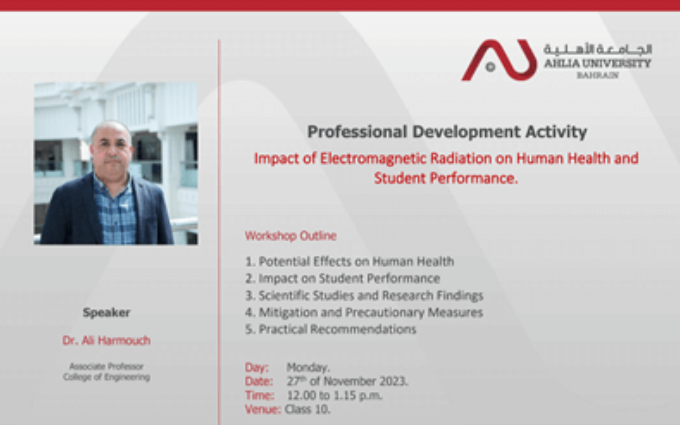

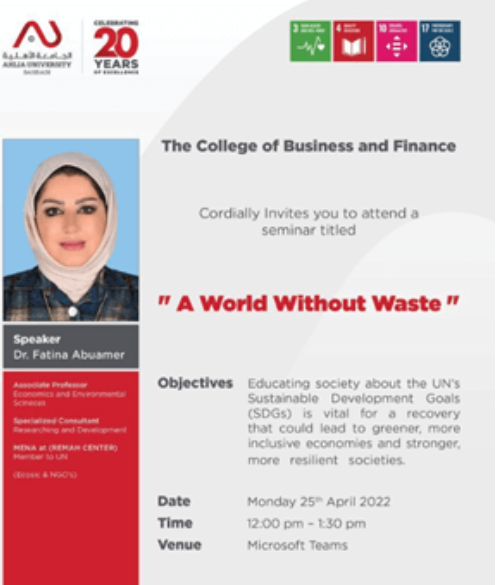
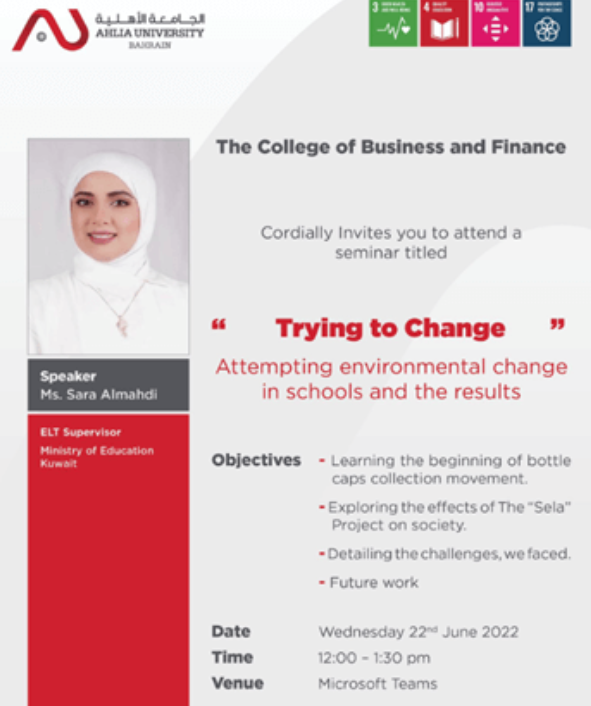
Sustainability in Education
Learn More About Sustainability in Education
One of the strategic objectives of Ahlia University is to create an exceptional learning environment characterized by high-quality academic and co-curricular programs, excellent and innovative teaching, preparing students for success in the global labor market and contributing to the prosperity of society.
The University ensures sustainability in education by focusing on the learning process, which includes themes such as citizenship, leadership, lifelong learning, experiential learning, and sustainability literacy.
The University offers many sustainability-related courses across various fields, providing an active, student-centered learning environment that actively supports sustainability.
Students learn together and from each other, inside and outside the classroom, becoming critical and engaged citizens. Concepts and strategies for sustainability are integrated into AU's programming, pedagogy, and assessments, equipping students and staff with the skills, values, experiences, and perspectives to address real-life challenges.
AU provides a range of teaching and learning strategies, including internships, enhancing employability and fostering lifelong learning.
In light of its vision, values, and strategic goals, AU's philosophy of teaching and learning focuses on two main ideas:
· Providing a learner-centered environment that promotes excellence, intellectual curiosity, and independent learning.
· Offering a transformative learning experience, enabling graduates to possess the knowledge, skills, and attributes needed to be engaged, ethical members of society.
Student Learning Outcomes Emphasizing Sustainability Competencies
Ahlia University has explicitly embedded sustainability competencies into its intended student learning outcomes and graduate attributes. Following UNESCO’s ESD guidelines, AU mapped key sustainability skills to its graduate attributes, focusing on competencies such as adaptability, personal resilience, connectivity, engagement, global citizenship, research, ethics, and innovation ahlia.edu.bh. These competencies are woven into course Intended Learning Outcomes (ILOs) at all levels – covering knowledge, applied skills, critical thinking, and transferable skills – with learning progressing over the four-year degree cycle ahlia.edu.bh. For instance, students engage in systems thinking through interdisciplinary projects on sustainable cities, practice critical thinking via case studies on ethical business and environmental challenges, and develop global citizenship outlooks through discussions of the SDGs in a local and international context. Each course is “carefully crafted with assurance of learning cascaded across 4 years of study”, and sustainability-related outcomes are assessed through both direct assessments (exams, projects) and indirect methods (surveys, reflections) ahlia.edu.bh.

Sustainability in Education
One of the strategic objectives of Ahlia University is to create an exceptional learning environment characterized by high-quality academic and co-curricular programs, excellent and innovative teaching, preparing students for success in the global labor market and contributing to the prosperity of society.
The University ensures sustainability in education by focusing on the learning process, which includes themes such as citizenship, leadership, lifelong learning, experiential learning, and sustainability literacy.
The University offers many sustainability-related courses across various fields, providing an active, student-centered learning environment that actively supports sustainability.
Students learn together and from each other, inside and outside the classroom, becoming critical and engaged citizens. Concepts and strategies for sustainability are integrated into AU's programming, pedagogy, and assessments, equipping students and staff with the skills, values, experiences, and perspectives to address real-life challenges.
AU provides a range of teaching and learning strategies, including internships, enhancing employability and fostering lifelong learning.
In light of its vision, values, and strategic goals, AU's philosophy of teaching and learning focuses on two main ideas:
Providing a learner-centered environment that promotes excellence, intellectual curiosity, and independent learning.
Offering a transformative learning experience, enabling graduates to possess the knowledge, skills, and attributes needed to be engaged, ethical members of society.
Revised Graduate Attributes:
In 2022, AU formally updated its institution-wide graduate attributes to reflect sustainability competencies. New attributes now include “Adaptability and Personal Resilience, Connectivity, Engagement and Local Citizenship, Research and Ethics, and Human Rights and Gender Equality” ahlia.edu.bh ahlia.edu.bh. By infusing these themes, AU ensures every graduating student possesses the values and skills needed to address sustainable development issues. Students are expected to become “engaged, ethical members of society” who can apply systems-thinking to real-world problems ahlia.edu.bh ahlia.edu.bh. Importantly, sustainability literacy itself is identified as a core outcome: AU’s learning process emphasizes “citizenship, leadership, lifelong learning, experiential learning, and sustainability literacy”, demonstrating that understanding sustainability is a deliberate educational goal ahlia.edu.bh. Students learn about environmental, social, and economic dimensions of sustainability within their courses, and often apply this knowledge in practical settings (internships, capstones), thereby strengthening their competency in sustainable problem-solving. By graduation, AU students are not only versed in their disciplines but have also internalized sustainability principles – capable of critical inquiry into global challenges and committed to responsible global citizenship ahlia.edu.bh.
Outcomes and Evidence:
The impact of these learning outcome initiatives is evident in student projects and research. AU reports that integrating SDGs into curricula has enhanced student engagement and produced tangible outputs, like community-focused research and innovative solutions ahlia.edu.bh. The university’s success in nurturing these competencies is reflected in external recognitions; for example, AU’s progress on SDG 4 education quality was showcased as a case study in national and international conferences ahlia.edu.bh ahlia.edu.bh. This indicates that Ahlia’s students and graduates have developed notable expertise in sustainability topics, validating the university’s approach to embedding sustainability in learning outcomes.
Faculty Training and Development for Sustainability Education
Ahlia University recognizes that achieving sustainability literacy among students requires empowered and knowledgeable faculty. Thus, AU has undertaken measures to build faculty capacity and encourage pedagogical innovation around sustainability. A key step was the formulation of a new Teaching and Learning Excellence Policy aligned with the SDGs and promoting lifelong learning skills ahlia.edu.bh. Introduced in 2021, this policy provides a clear pedagogical framework that guides faculty on integrating critical sustainability concepts and skills into their teaching ahlia.edu.bh. It emphasizes learner-centered, innovative teaching methods and the inclusion of real-world sustainability challenges in coursework. By formally embedding these expectations, AU ensures faculty are continually developing courses in line with global sustainability education trends.

Workshops, Seminars, and Forums:
AU actively hosts and participates in training sessions and knowledge-sharing events related to education for sustainable development. The university organizes seminars and workshops through its Sustainable Research Centre to disseminate the latest research findings on sustainability and to foster knowledge exchange among faculty and students ahlia.edu.bh. For example, the Sustainable Research Centre periodically holds interdisciplinary seminars on topics like climate policy, sustainable design, and renewable energy, where faculty can learn about new developments and research-driven teaching content ahlia.edu.bh ahlia.edu.bh. In addition, Ahlia has been engaged in international forums focused on sustainability in higher education. In the 2020–2022 period, AU conducted or co-hosted multiple forums and webinars on Quality Education and SDGs, attracting dozens of local and international experts (including government officials, UN representatives, and academics) ahlia.edu.bh ahlia.edu.bh. These public events – for instance, an “Education Excellence Sustainability Virtual Forum” in 2020 – served as professional development opportunities for AU faculty, exposing them to best practices in teaching sustainability and virtual learning innovations ahlia.edu.bh. The forums helped set “clear measures for UNSDGs specifically SDG4” in the university’s context ahlia.edu.bh, essentially training faculty and leadership on how to advance SDG-aligned education quality.
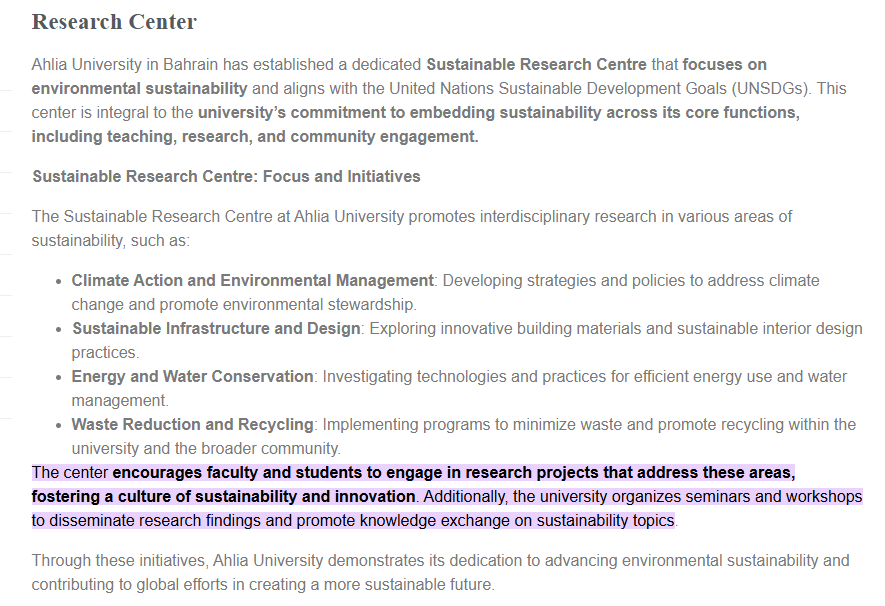
Faculty Support Structures:
Internally, Ahlia’s Sustainable Development Committee, in coordination with the Centre for Accreditation and Quality Assurance (CAQA), oversees the integration of sustainability in academics and likely mentors faculty in this process ahlia.edu.bh. This committee, active since 2020, works across departments to ensure faculty incorporate SDG themes and to share resources for sustainability teaching. Moreover, AU provides incentives for faculty engagement with sustainability scholarship – the Sustainability Policy explicitly “encourage[s] academic faculty and students to publish research covering a wide range of sustainability aspects” ahlia.edu.bh. By promoting research on sustainability (and even funding or recognition for such research), the university indirectly trains faculty to deepen their expertise in sustainability topics, which then informs their teaching.
Through these policies and development programs, AU cultivates faculty who are equipped to teach complex sustainable development issues. Faculty members have access to continuous professional development in sustainability, whether through structured policy guidelines, cross-sector workshops, or collaborative research initiatives. This ensures that the delivery of sustainability literacy in classrooms is led by knowledgeable and up-to-date educators.
Co-Curricular and Extracurricular Activities Enhancing Sustainability Literacy
Learning at Ahlia University is not confined to the classroom – a rich array of co-curricular and extracurricular activities reinforces sustainability literacy and student engagement with real-world issues. Foremost among these is the Ahlia Sustainability Club, a student-led organization dedicated to promoting environmental stewardship and social responsibility on campus and beyond ahlia.edu.bh. Founded in recent years, this club has become a vibrant hub for sustainability awareness. It plays a “pivotal role in promoting environmental stewardship and social responsibility within the university community” ahlia.edu.bh, aligning its initiatives with AU’s broader SDG commitments.
Ahlia Sustainability Club
Ahlia University in Bahrain has an active, student-led organization dedicated to sustainability called the Ahlia Sustainability Club. This club plays a pivotal role in promoting environmental stewardship and social responsibility within the university community and beyond.
Ahlia Sustainability Club: Purpose and Activities
The Ahlia Sustainability Club is a passionate and proactive group of students committed to fostering sustainable practices and raising awareness about environmental issues. Their initiatives align with Ahlia University's broader commitment to sustainability and the United Nations Sustainable Development Goals (SDGs).
Key Activities and Objectives:
· Advocacy and Awareness: Organizing campaigns, workshops, and events to educate and engage the university community on pressing environmental issues and sustainable practices.
· Innovative Projects: Implementing projects focused on waste reduction, energy conservation, water efficiency, and other sustainability initiatives that have a tangible impact on campus and the local environment.
· Collaboration and Partnerships: Working in conjunction with other student organizations, academic departments, and external partners to promote a culture of sustainability across various domains.
· Education and Skill Development: Providing educational programs and workshops to equip members with the knowledge and skills necessary to lead sustainable initiatives and advocate for environmental responsibility.
· Community Engagement: Extending influence beyond the campus by engaging with local communities, organizing outreach programs, and participating in regional sustainability initiatives.
The club warmly welcomes all Ahlia University students who share a passion for sustainability and a desire to make a positive impact. By joining, students have the opportunity to actively contribute to creating a more sustainable future while gaining valuable leadership and teamwork experience.
Student Club Initiatives:
The Ahlia Sustainability Club engages students through multiple avenues:
- Advocacy and Awareness Campaigns:
Club members organize campus-wide campaigns, seminars, and awareness days to educate peers on pressing sustainability issues (e.g. climate change, plastic waste, energy saving) ahlia.edu.bh. They have hosted workshops on topics like recycling best practices and sustainable living, often featuring guest speakers or interactive activities to drive student participation. These efforts nurture a culture of sustainability consciousness among the student body.
- Innovative Projects:
The club spearheads hands-on projects that improve campus sustainability. For example, students have launched initiatives for waste reduction (introducing recycling bins and upcycling drives), energy conservation (awareness to switch off lights/equipment), and water efficiency audits on campus ahlia.edu.bh. Such projects allow students to apply their classroom knowledge pragmatically, enhancing their systems thinking and problem-solving skills in sustainability. The impact is tangible – reductions in waste or energy use on campus – which reinforces learning with real outcomes.
- Collaboration and Partnerships:
The Sustainability Club frequently collaborates with other student societies, academic departments, and even external organizations. Joint events have included tree-planting campaigns in partnership with local environmental groups and SDG-themed competitions with other universities. This collaborative approach helps mainstream sustainability across different student interests and academic disciplines ahlia.edu.bh.
- Education and Skill Development:
Beyond activism, the club focuses on building its members’ skills. It runs internal training sessions on project management, leadership, and environmental problem-solving ahlia.edu.bh. Senior club members mentor juniors in conducting sustainability audits or leading events, thus developing leadership and ethical reasoning abilities among students. By providing these opportunities, the club ensures that students are not only aware of sustainability issues but also capable of taking initiative to address them.
- Community Engagement:
True to the spirit of global citizenship, the club extends its activities off-campus. It has organized community outreach such as clean-up drives at local parks, volunteering with recycling campaigns in Manama, and visits to schools to promote the SDGs ahlia.edu.bh ahlia.edu.bh. These experiences broaden students’ perspectives and instill a sense of responsibility towards society and the environment.
Competitions and Events: Ahlia University also encourages student participation in sustainability-related competitions and events, which bolster experiential learning. Notably, AU students have competed in regional environmental competitions; for example, an AU student team took part in a scientific competition organized by the Emirates Environmental Society, conducting research on the impacts of global temperature rise and urbanization on the environment ahlia.edu.bh. Through such experiences, students apply research and critical thinking skills to real sustainability challenges, often earning recognition for the university. AU also holds an annual interdisciplinary conference (in collaboration with Brunel University London and others) on Equal Opportunities in Business and Technology, which, while centered on SDG 5 (gender equality), exposes students to broader sustainability dialogues and offers opportunities to volunteer at the event or present papers ahlia.edu.bh. Additionally, the university has a tradition of celebrating Earth Day every year: AU’s sustainability policy commits to “participate in the Annual Earth Day and encourage students to attend sustainable activities” ahlia.edu.bh. Each Earth Day, student volunteers join tree-planting campaigns, campus sustainability fairs, and talks on environmental protection as part of this global event, thereby reinforcing their sustainability learning through celebration and action.
These co-curricular and extracurricular engagements significantly enhance sustainability literacy by allowing students to learn by doing. They complement classroom learning with practical skills – from organizing awareness campaigns (communication and teamwork) to implementing green solutions (innovation and applied knowledge). Moreover, such activities foster a passionate community of practice on campus, ensuring that sustainability is a living part of student life at Ahlia. As a result, graduates carry forward not just academic knowledge of sustainability, but also personal experience in advocacy, ethical leadership, and community service related to sustainable development.
University-Wide Initiatives to Assess and Measure Sustainability Knowledge
Ahlia University employs both internal and external mechanisms to assess the sustainability knowledge and awareness of its students and staff, ensuring continuous improvement in sustainability literacy. This commitment to assessment is evident in annual reporting, surveys, and quality assurance processes from 2020 onwards.
Annual SDG Progress Reporting:
AU systematically tracks its progress on sustainability initiatives and learning outcomes as part of its contributions to the United Nations Higher Education Sustainability Initiative (UN HESI). Each year, the university compiles a report of major achievements related to the SDGs, including how well sustainability has been integrated into the curriculum (supporting SDG 4 on education) ahlia.edu.bh. This voluntary reporting is shared on the UN HESI platform, which also acts as a progress tracker for AU’s commitments ahlia.edu.bh. By doing so, Ahlia effectively measures how many courses, programs, and research outputs align with SDGs and reflects on areas for enhancement. The university notes that its “journey towards UNSDGs is annually assessed and reported”, both for internal strategy and external accountability ahlia.edu.bh. This annual self-assessment ensures that sustainability literacy targets (such as the inclusion of ESD outcomes in all programs) are monitored and met over time.

Quality Assurance Mechanisms:
Internally, the Centre for Accreditation and Quality Assurance (CAQA), together with the Sustainable Development Committee, has embedded sustainability into AU’s academic quality review cycle. A new Annual Programme Review Procedure was developed to “assess the extent of improvements made to academic structure and curricular on an annual basis” ahlia.edu.bh ahlia.edu.bh. This means each academic program is reviewed yearly to evaluate, among other things, the integration of new content like sustainability topics and the achievement of related learning outcomes. Any gaps in student attainment of sustainability competencies can thus be identified and addressed through curricular adjustments. Additionally, AU’s revision of graduate attributes (as noted earlier) provides built-in metrics – e.g. assessing student performance in “global citizenship” or “ethical reasoning” via course assessments and surveys helps measure growth in those areas. The Teaching and Learning Excellence Policy also likely calls for periodic evaluation of teaching practices, indirectly assessing how well faculty are incorporating sustainability principles in their pedagogy ahlia.edu.bh.
Survey of Sustainability Awareness:
In 2024, an academic study was conducted to directly gauge the level of sustainability awareness among Ahlia students, offering valuable data to the university. A survey of 346 AU students measured their knowledge of sustainable development concepts, behaviors, and attitudes researchgate.net researchgate.net. The results, published in August 2024, found that while students had a reasonable level of knowledge and awareness of sustainability – especially regarding sustainable actions and behaviors – there were gaps in their understanding of some core sustainability concepts researchgate.net researchgate.net. This targeted assessment provided actionable insights. The study recommended that AU should continue to incorporate sustainability into the curriculum, offer more sustainability-focused degrees, strengthen extracurricular activities, and model sustainable practices on campus to improve knowledge in areas where students were weaker researchgate.net researchgate.net. These recommendations aligned perfectly with AU’s ongoing strategy, reinforcing the importance of its efforts. The research exemplifies how the university not only teaches sustainability but also critically evaluates the effectiveness of that education. Such data-driven reflection helps AU refine its approaches (for instance, by introducing additional workshops on fundamental sustainability topics if survey responses indicate misconceptions).
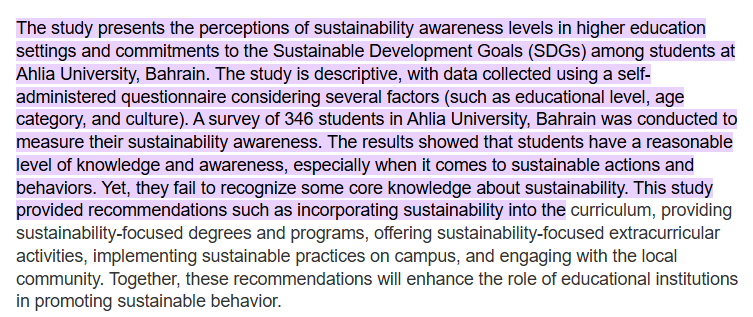
By combining qualitative and quantitative assessment tools, Ahlia University demonstrates a commitment to measuring sustainability literacy outcomes. These measures ensure that both students and staff are progressing in their understanding of sustainability. The feedback loops – from annual reports to surveys – allow AU to celebrate successes (like high participation in sustainability events or improved sustainability research output) and to identify areas needing more focus (such as deeper conceptual understanding or wider staff engagement). This culture of assessment underpins continuous improvement in sustainability literacy at the institution.
Institutional Strategies and Policies for Sustainability Literacy
Sustainability literacy at Ahlia University is reinforced by top-level institutional strategies and formal policies that signal a strong commitment across the university’s mission and operations. Several key strategies and policies enacted since 2020 provide a framework that sustains and advances education for sustainable development across all disciplines:
Strategic Planning and Governance:
Sustainability and social responsibility are embedded in AU’s vision and strategic plan. The university’s Strategic Plan (2021–2025) explicitly integrates the SDGs, asserting that AU “considers Social Responsibility and Sustainability as part of its prioritized strategies” within core functions of teaching, research, and community service ahlia.edu.bh. To operationalize this, Ahlia carefully aligned its strategy with Bahrain’s National Strategies and the UN 2030 Agenda, selecting seven SDGs to focus on (including Quality Education, Gender Equality, Climate Action, etc.) ahlia.edu.bh. AU aims to “create an impact at national, regional and international level for a sustainable future for our next generations” ahlia.edu.bh. This high-level plan ensures that every college and department works toward common sustainability literacy goals. The establishment of a Sustainable Development Committee to coordinate SDG initiatives (in partnership with the QA center) provides governance structure for implementation ahlia.edu.bh. In practice, this committee oversees policies, plans events, and tracks progress, ensuring sustainability isn’t siloed but is a shared institutional priority.

Sustainability Policy:
In June 2023, Ahlia University approved a comprehensive Sustainability Policy to guide campus operations and culture. This policy demonstrates AU’s holistic commitment to sustainability, touching on academics, operations, and outreach. It includes measures to encourage sustainability research, green campus practices, and community engagement. Notably, the policy commits AU to “encourage academic faculty and students to publish research covering a wide range of sustainability aspects” and to “participate in the Annual Earth Day”, engaging students in sustainable activities ahlia.edu.bh ahlia.edu.bh. It also covers operational commitments like reducing energy consumption, using recycled materials, and promoting healthy, low-waste food habits on campus ahlia.edu.bh. By codifying these practices, the policy ensures that the campus environment itself serves as a living laboratory of sustainability, reinforcing what is taught in the classroom with real examples of sustainable practice. Furthermore, the policy’s emphasis on knowledge sharing (e.g. collaborating with society to raise awareness and protect the environment) aligns with the goal of spreading sustainability literacy beyond campus borders ahlia.edu.bh ahlia.edu.bh.
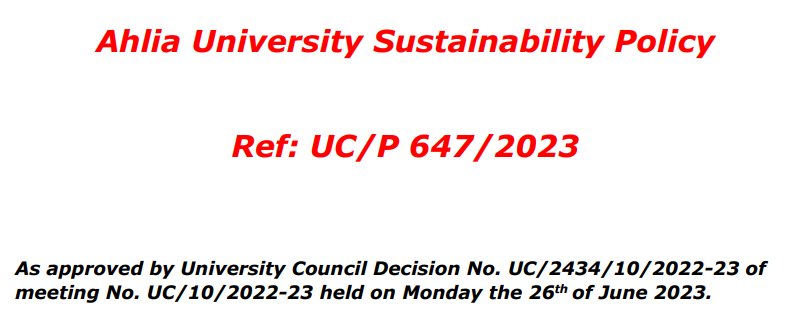
Ahlia University seeks to contribute to the sustainable development of its
community through promoting the following sustainable practices:
1. Encourage academic faculty and students to publish research covering a wide
range of sustainability aspects.
2. Encourage the use of recycled long life building materials in construction,
renovation and refurbishment work.
3. Commit to reducing campus electricity consumption by using electric timers,
heat insulations and purchasing low electrical consumption devices.
4. Encourage staff and students to enhance food consumption habits to healthy
habits mitigating health risks and unnecessary food waste.
5. Collaborate with society to recycle unnecessary materials considered as
garbage waste.
6. Participate in the Annual Earth Day and encourage students to attend
sustainable activities.
7. Commit to using renewable energy.
8. Commit to using biofriendly cleaning materials.
9. Commit to upgrading its operation system to go digital.
10.Collaborate with society to encourage the protection of natural wildlife
environment.
Education and Quality Policies:
In support of sustainability literacy, AU has also updated its educational quality assurance policies. The Teaching, Learning Excellence Policy (2021) explicitly integrates principles of sustainable education – focusing on lifelong learning, digital transformation in learning (to reduce environmental footprint and increase resilience), and inclusive pedagogy ahlia.edu.bh ahlia.edu.bh. The policy drives innovative teaching methods that prepare students as global citizens. Additionally, as mentioned, the Graduate Attributes Framework was revised to incorporate sustainability (e.g. global citizenship, ethical leadership, adaptability), which is effectively an institutional policy on the qualities every student should graduate with ahlia.edu.bh. This revision compels all academic programs to embed these attributes and thus permeates sustainability across all disciplines by design. AU’s Annual Programme Review Procedure, another policy instrument, ensures continuous alignment of programs with these sustainability-focused attributes and the SDGs ahlia.edu.bh. In essence, sustainability is now a criterion in curriculum development and review, cementing its presence for the long term.
Campus-Wide Culture and Initiatives:
Ahlia University’s strategy extends to creating a campus culture that values sustainability. Decision-making at AU incorporates sustainability considerations – “all decisions at AU are made with a sustainable future in mind”, supported by specific policies like an Environmental Policy and a Paper Use Policy ahlia.edu.bh. The university aspires to be a model institution for sustainability in the GCC region, upholding the highest standards on campus and in outreach ahlia.edu.bh. To achieve this, AU’s leadership has prioritized efforts such as converting operations to digital systems (reducing paper), investing in renewable energy on campus, and engaging in partnerships for sustainable development research ahlia.edu.bh ahlia.edu.bh. Moreover, AU’s policies emphasize community and global engagement – sharing knowledge and “raising awareness about sustainable practices” is an explicit objective ahlia.edu.bh. By sharing expertise and working with external partners (industry, government, other universities), Ahlia amplifies its impact on societal sustainability literacy while also bringing external insights back to campus.
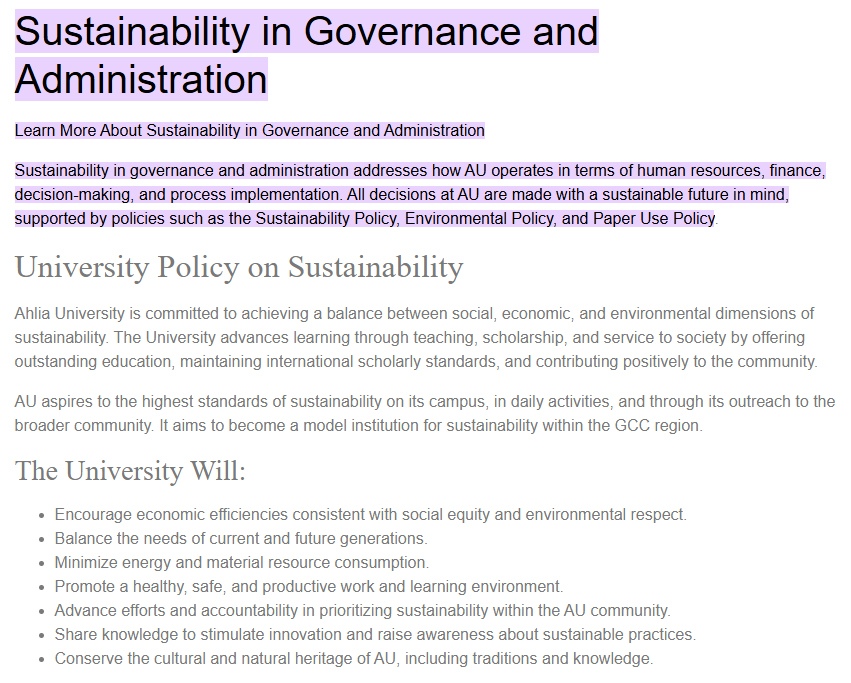
In summary, Ahlia University’s institutional strategies and policies create an enabling environment for sustainability literacy to flourish. From the highest levels of planning to everyday campus practices, sustainability is a guiding principle. This top-down support, combined with bottom-up initiatives from students and faculty, ensures a cohesive and sustained commitment. The presence of clear policies and dedicated committees means that sustainability literacy is not a transient project at Ahlia, but rather an integral part of the university’s identity and continuous improvement framework. As a result, Ahlia University can demonstrate to THE Impact Rankings – and more importantly to its stakeholders – that it is producing graduates who are not only academically accomplished but also conscious, informed, and proactive contributors to a sustainable future ahlia.edu.bh.

Copyright 2024 © All rights Reserved. Ahlia University
